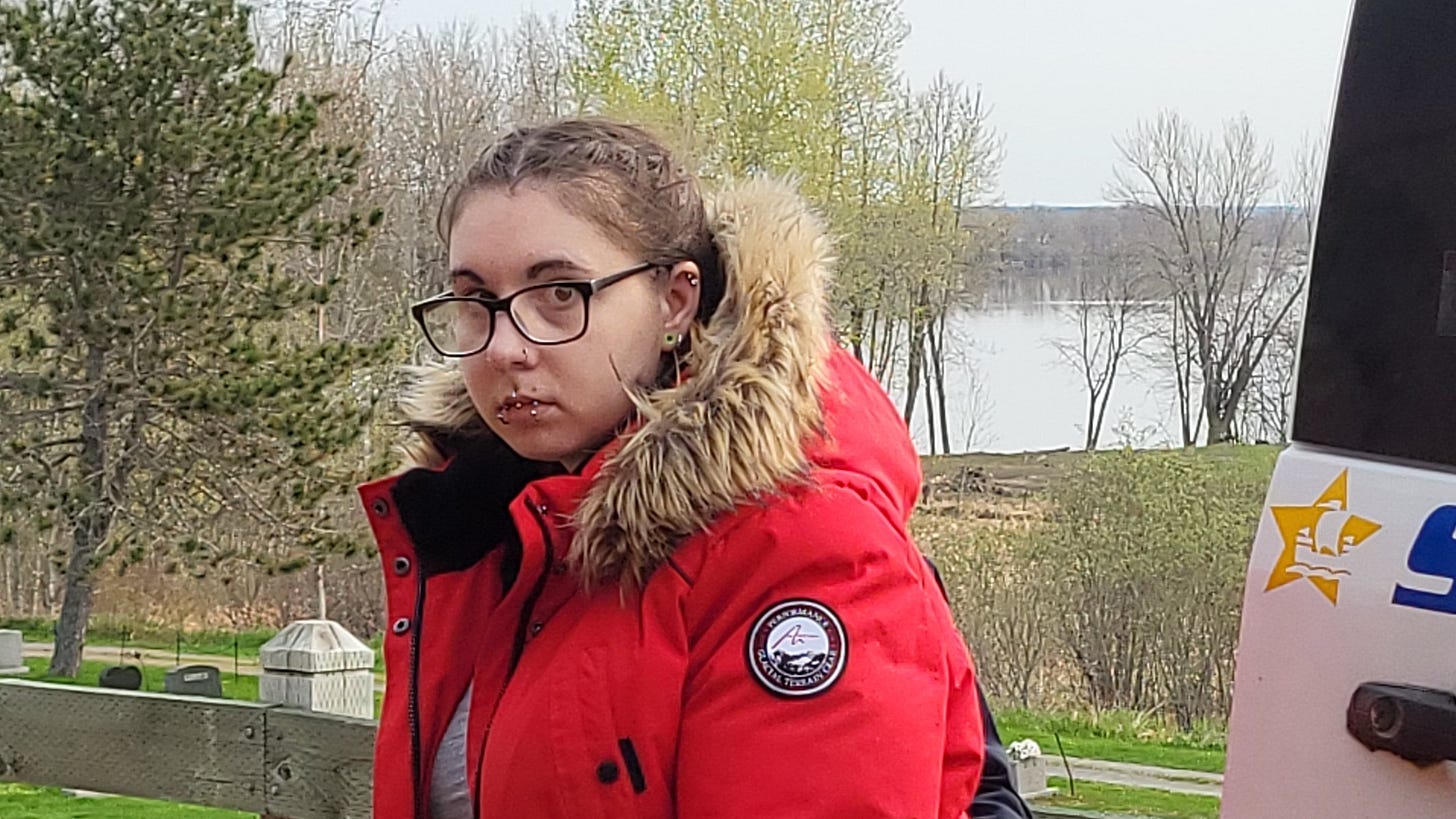Brutality of grisly murder haunts victim’s family
Judge heard arguments Thursday on when Angela April Walsh, 24, of Fredericton, should be allowed to apply for parole during her life sentence for second-degree murder
Warning: This story contains graphic descriptions of a violent crime.
The mother and younger brother of a man killed three years ago said Thursday that God loves the woman who stabbed the victim almost 20 times as much as he does them and their lost loved one.
Angela April Walsh, 24, AKA Ali Morningstar, formerly of Kings College Road, was back before Court of King’s Bench Justice Kathryn Gregory at the Burton Courthouse on Thursday for her sentencing hearing for murder.

She had been scheduled to stand trial in January before a Court of King’s Bench judge and jury on a charge of first-degree murder in the stabbing death of Clark Ernest Hunter Greene.
However, the trial took an unexpected turn on the first day of testimony when a key witness - Zachery David Murphy, 23, Walsh’s spouse - gave testimony contrary to what he’d told police and gave at Walsh’s preliminary hearing.
That halted the first-degree murder trial, and after the prosecution and defence conferred during a lengthy recess, court reconvened, which is when Walsh admitted to second-degree murder.
At Walsh’s preliminary hearing, Murphy testified that’s how the murder went down, and the same story was relayed to the court during his sentencing hearing.
When Walsh pleaded guilty in January, she admitted she had lured Greene, 31, to Wilmot Park in downtown Fredericton in the early-morning hours of April 15, 2020, where they met at the gazebo.
Court heard Murphy was laying in wait unbeknownst to Greene, and he snuck up and struck him in the head with a pipe, incapacitating him.
Walsh agreed she’d taken a knife from Greene’s pocket, climbed on top of him as he lay on the ground, and stabbed the victim repeatedly – in the chest and face.
However, when he took the witness stand in Walsh’s trial in January, he instead claimed he’d stabbed Walsh and didn’t know where she was when he did so.
Crown prosecutor Rachel Anstey noted Greene was stabbed in the face seven times and the chest 12 - with one blow puncturing his heart and another his lung.
Court also heard Walsh gouged out Greene’s eyes.
Someone out for a walk later that morning discovered the body at the park gazebo.
A family’s pain
Members of Greene’s family read victim-impact statements aloud in court Thursday, and they shared their pain at having lost him in such a violent and disturbing fashion.
“Trust me - you can never really process that your son’s been savagely murdered,” said Cynthia Greene, the victim’s mother, noting he was killed just as the world entered the initial lockdown phase of the COVID-19 pandemic.
“My life was shattered during lockdown, and it will never be normal again.”
The mother noted she’s haunted by how her son died and how his naivete and autism was likely used against him to target him.
Cynthia Greene said Thursday she now avoids Wilmot Park at all costs, which means she can’t even take her granddaughter - the victim’s little girl - to the splash pad, where just about all kids in Fredericton want to go in the summer.
Attending court has been difficult, she said, as has meeting with prosecutors to listen to and view evidence that had been expected to be presented at trial.
She said she had to endure hearing Walsh tell police in a warned statement about the noises her son made as she stabbed him and describe the sounds his eyes made as they popped when she stabbed them with the knife.
Cynthia Greene said despite having to experience such horrors over and over, she was determined to be in court for Clark.
“Somebody has to be here today… to make sure he’s never abandoned again,” she said.
Cynthia Greene said her son was a bright light, always positive and seeing the best in others - even if some of those people were manipulating him because of his autism and yearning to make friends.
She said some of her fondest memories of Clark were of gardening together, as he’d always help her outside the house, and she misses him the most when she works outside.
“Some days I just can’t bring myself to do yard work at all,” she said.
“Even the happy memories make me cry, but that’s all he is now - a memory.”
Cynthia Greene said it was shortly after Clark’s death that her father, in his 90s, suffered a debilitating stroke, and she’s sure the tragic news of the murder was “a fundamental factor” in his major health setback.
Fear and forgiveness
She and her other son - Ross Greene, Clark’s younger brother - told court their Christian faith has seen them through the ongoing ordeal.
“I want to experience the vivid colours of life as Clark did,” Cynthia Greene said, adding she realized she couldn’t do that carrying around her anger at how he was taken from her.
“I’ve had to let go of resentment and animosity … I’m not seeking vengeance.”
She said she believes God loves Walsh as much as He does her and her sons.
Ross Greene told the court that like Walsh, he had struggled with addiction in his life, and he was in the fourth month of a 10-month recovery program when he learned his big brother was killed.
He continued with his recovery program, he said, which brought him closer to God and put him in touch with his faith.
“God revealed to me that Clark is now with Jesus,” Ross said, adding he knows God loves Walsh as well, “just as much as he loves me.”
He forgave Walsh and told her “that she matters.” Ross Greene said he feels his faith drove him to deliver his victim-impact statement as a means to help Walsh.
Cynthia Greene said while she feels God loves Walsh, she was leery of the possible danger the offender still poses to society.
“Certainly at this point, we know she can’t be trusted,” she said of Walsh, noting she hadn’t heard any expressions of remorse from her. “She needs to own her actions.”
Cynthia Greene said she doesn’t feel safe anymore and is constantly worried about the safety of loved ones.
“In fact, it would be irrational to feel safe,” she said.
She suffers from night terrors and panic attacks, court heard, and she worries when she doesn’t hear back from family members soon after she contacts them.
Crown prosecutor Rachel Anstey read the statement prepared by Kelli Greene, the victim’s aunt, into the court record, and like Cynthia and Ross Greene, she reported the murder has cast a pall over her life.
“I find myself looking at my world in a very different way now,” she wrote.
“I dream of eyeless creatures chasing my family in the dark with knives.”
Kelli Greene said she’s dismayed that Walsh had shown no remorse for what she did.
“I am skeptical of rehabilitation being possible,” she said.
Arguments on parole eligibility
Walsh’s sentence has already been determined, as there’s only one prescribed in the Criminal Code of Canada for murder charges: life in prison.
However, the court still had to determine the parole-eligibility component of the sentence.
With first-degree murder, the only sentence is life in prison with offenders being able to apply for parole after 25 years. With second-degree cases, the parole eligibility can kick in anywhere between 10 to 25 years.
When an offender achieves parole eligibility, that doesn’t mean he or she will get parole at that time, only that they can then apply to the Parole Board of Canada to consider the issue.
The Crown argued for Walsh to be ineligible to apply for parole for the first 15 years of her sentence, while the defence pushed for 12 years.
“The brutality of this offence is an aggravating factor,” Anstey said, noting that even after stabbing Greene 19 times, Walsh beat him in the face repeatedly with a pipe.
And then she continued with her feet, the prosecutor said.
“She was stomping on his face,” Anstey said, adding Greene had no defensive wounds, meaning he was likely unconscious and helpless after Murphy had brained him at the outset of the attack.
Other aggravating factors included the luring element involved, she said, as well as the planning that went into the ambush and planned robbery of the victim.
Walsh’s conduct after the killing was something for the court to consider as well, the prosecutor argued, noting that she directed Murphy to walk all around downtown Fredericton in an effort to spread their scent around to fool police dogs.
Murphy’s parole eligibility was set at 11 years, Anstey said, and Walsh’s should be more since she was the driving force behind the crime and the one who actually killed Greene.
“In terms of involvement, Angela Walsh is clearly the primary actor here,” she said.
The prosecutor noted Murphy had expressed remorse from the time he was arrested, which was a mitigating factor that was lacking in Walsh’s case. There’s no indication of it in her pre-sentence report either, she said, and Walsh hasn’t explicitly explained her motive for the murder.
Defence lawyer T.J. Burke said the case is clearly an emotional one, noting the victim-impact statements were quite moving.
But the court needs to uphold the principles of sentencing, not the emotions, and focus on “dry-eyed justice,” he argued.
“You can’t just look at the brutality,” Burke said, urging the court to look at the offender and her background.
Court heard she’s a product of the foster-care system and suffered emotional, physical and sexual abuse as a result.
The defence lawyer said his client suffers from a variety of mental-health issues as a result, and predictably, she turned to illicit substances.
“She turned to drugs to reduce the pain,” Burke said, noting Walsh was using crystal meth and heroin regularly.
Those behaviour-altering drugs were a significant factor in this horrible crime, he said.
Burke cited numerous cases supporting a 12-year period to reach parole eligibility, noting some of the facts of those precedents were worse than the one before the court.
Thursday’s proceedings concluded with the quietest voice in the courtroom: Walsh herself.
“I’m sorry for all the harm… I caused his family,” she said meekly.
The killer also apologized to her stepmother, who was present for the hearing. Walsh said she struggled with mental illness and addictions for a long time.
“I’m trying to work on my sobriety,” she said.
Gregory reserved her decision on when she’ll allow Walsh to apply for parole to June 16, and she remanded the offender back into custody until that time.
You can contact Don MacPherson at ftonindependent@gmail.com.






Mr. Burke says you can't only look at the brutality.
After you read the brutality it is hard to look at anything else.
She will get 12 -14 years. She will be out of prison in her late 30's. Canada does not have a justice system. We have a forgive the criminal and forget the victim system.